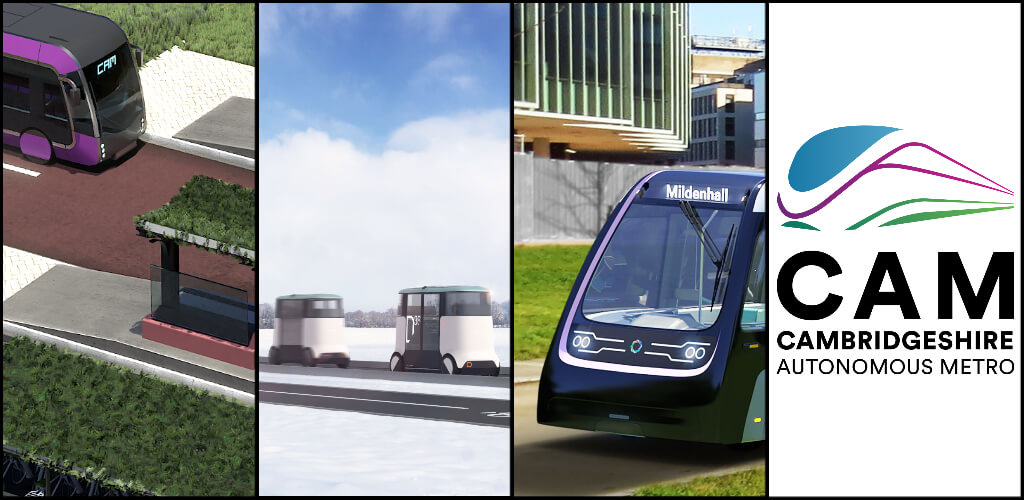
Mayor James Palmer challenges brightest and best to deliver conceptual designs for pioneering Metro scheme
Some of the best brains in engineering, science, tech and digital are being challenged to shape the future of the Cambridgeshire Autonomous Metro (CAM) by developing conceptual designs for the vehicle, its infrastructure and how the system might operate.
The Cambridgeshire & Peterborough Combined Authority is testing the market for existing and potential technologies, innovations, designs, operational systems and commercial ideas which conceptualise an in-the-round mass transit solution which meets the key aims of CAM.
Mayor James Palmer said the CAM could form a template for the future of public transport in other small cities and regions across the globe.
The conceptual design challenge is casting the net as wide as possible by encouraging participation across consultancy firms, small businesses, academics and other experts. Consortiums are also welcomed, enabling suppliers with certain fields of expertise to join with others in providing a whole CAM solution.
Bold, creative, but also realistic and value-for-money designs are required to cover:
The CAM vehicle: What a proposed autonomous metro vehicle could look like, including considerations around guidance, operating systems and how it can be futureproofed against rapidly changing technology.
CAM infrastructure: What infrastructure the vehicle would run on, including the IT system and recommended approaches for their design, build, operation, safety assurance and maintenance.
Operations: How the CAM will run, and what the customer experience should be like.
Commercial relationships: Creative opportunities for revenue streams which will support the funding of the CAM.
The environment: Ensuring CAM is world leading in protecting the environment.
The resulting three conceptual designs are targeted to be completed in March 2021. They are not intended to be the conclusive delivery solution for CAM, but will help inform how the scheme develops further. They will help identify opportunities for innovative approaches, support the development of a business case, and build interest from suppliers more widely who at some stage may want to bid on future phases of CAM work.
Mayor James Palmer said:
“We’re putting bold, fresh thinking at the heart of CAM’s delivery. This conceptual design challenge is indicative of that approach.
“Cambridgeshire and Peterborough has a dynamic economy built on innovation, where big ideas, pioneering research and a cutting edge, entrepreneurial tech sector attract some the world’s most talented people. There could not be a better place in the UK to develop a new model for public transport which meets the needs of a small city and its wider region.
“This process is about the art of the possible. We’re inviting some of the brightest minds locally and beyond to design a CAM solution which supports a sustainable economic future for our region. That means building a system which not only delivers reliable, affordable, convenient and clean journeys, but also creates more jobs, spreads prosperity further and allows for the sustainable, well-planned housing growth that we need to meet demand.
“We want to bring the benefits high-quality public transport normally reserved for cities of half a million people or more. There will be many places globally, of a similar population size to us, which would benefit from the same. Because of this, we can also create a new growth industry for the region, centred around the future of mobility, with CAM as the launchpad.”
A staged procurement process, starting early October, will ultimately identify by December 2020, three top scoring tenderers who will be awarded contracts to develop the conceptual designs in full. Three sequenced milestones – ‘stage gate’ reviews – will follow, ensuring the best possible designs are delivered by the target date of March 2021.
The Authority will also establish an arrangement to retain access to those successful suppliers for the purposes of further engagement regarding their proposed conceptual designs for CAM.
In the meantime, the development of CAM is ongoing, including through the continued establishment of a special purpose vehicle (SPV) delivery body, called One CAM Limited. The Combined Authority Board will, on September 30, be recommended to appoint Cambridge’s Lord Mair, Robert Mair CBE, one of the world’s foremost authorities on tunnel engineering, as its first Board chair.
There is still time for suppliers to enter the conceptual design process, with more information via the Prior Information Notice link.
- Proposals to save 31 and 9/X9 bus routes to be put to Combined Authority Board
- Mayor encourages residents to take part in Local Nature Recovery Strategy public consultation launching today
- Five targeted skills projects backed to tackle further education ‘cold spots’ and benefit 9,400 learners
- Paul Bristow statement: English Devolution and Community Empowerment Bill
- Milestone for ARU Peterborough as first graduates set for celebration
- Mayor Paul Bristow statement in response to Government announcement of funding for 50 road and rail upgrade projects

